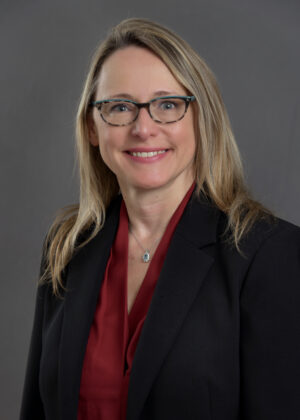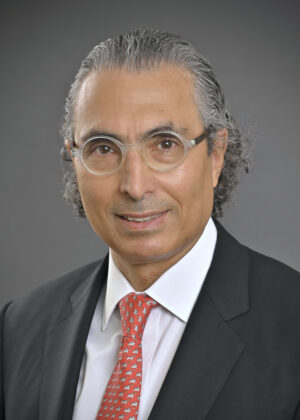Northwell Health introduces new members of its local leadership team
On Thursday, July 11, the Northern Westchester Hospital Foundation, part of the Northwell Health system, held a reception in Bedford Hills to introduce new members of its leadership team. Anna Komorowski, M.D., joins Northern Westchester Hospital in Mount Kisco and Phelps Hospital in Sleepy Hollow as regional director of the Northwell Health Cancer Institute in Westchester County, while Bushra Mina, M.D., is the new chair of medicine and chief of pulmonary critical care and sleep medicine at Northern Westchester Hospital.
Both are affiliated with the Donald and Barbara Zucker School of Medicine at Hofstra/Northwell in Hempstead, New York – Komorowski as an assistant professor and Mina as an associate professor. Both have immigrant stories – Komorowski’s beginning in Poland; Mina’s, in Egypt. Both come from several generations of doctors. And both saw in those generations how medicine can transform lives.
Recently, they took time to talk with Westfair about their respective specialties, which are often at the forefront of patients’ concerns and scientific advancement:
 Anna Komorowski, M.D., regional director of the Northwell Health Cancer Institute in Westchester County
Anna Komorowski, M.D., regional director of the Northwell Health Cancer Institute in Westchester County
As regional director of Northwell’s cancer institute in Westchester, Komorowski has seen the rise of breast and colorectal cancers among younger adults, particularly the rise in rectal cancers to such an extent that the recommended age for colorectal cancer screening in the United States has dropped from 50 to 45 – although Komorowski said she is seeing people in their 30s and 40s with the disease. Colorectal cancer affects men more than women and African Americans disproportionately.
Meanwhile, more women under age 50 are being diagnosed with breast cancer, with screening starting at age 40. The recommended age for screening could drop, Komorowski said, though such changes take time – and have insurance implications.
As for potential causes for these cancers at younger ages, Komorowski rounds up the usual suspects, including obesity; a diet that includes red meat and processed foods, thus disturbing the symbiotic bacteria, or “gut flora,” of the intestines; smoking; and alcohol.
“There were studies that showed a glass of red wine was good for you,” she said of past research that has been debunked. “Now we know that alcohol is like smoking.”
With Ireland set to be the first country to introduce warning labels on bottles of alcohol in May 2026, Komorowski said, “Labels are important, but people will still drink.” Advertising and talking about the risks of drinking – and knowledge of your own family’s medical history – are more effective tools. For women, who are more sensitive to alcohol than men, she suggested spacing out drinks to no more than two a week.
As for vaping and smoking marijuana, there is a lack of good data on their relationship to cancer, she said, adding that you’re still inhaling toxins that can cause cardiovascular and lung disorders, not to mention the behavioral health issues related to marijuana.
Fluent in Polish and English and board-certified in medical oncology and hematology, Komorowski earned her medical degree from the Medical University of Warsaw, where she was raised in a family of doctors. She speaks with pride about her physician-parents and her grandmother, who became a doctor in the 1920s and ’30s, when prejudice was rife against women in the profession. Coming to the United States 29 years ago, Komorowski completed an internal medicine residency at Our Lady of Mercy Medical Center, now Montefiore Medical Center–North Division in the Bronx, and a hematology and medical oncology fellowship at New York Medical College in Valhalla.
She lives in Chappaqua, which she described as an easy commute to Northern Westchester and Phelps hospitals, where she exercises the quality that she saw in her own family of physicians – “the gift to help people.”
 Bushra Mina, M.D., chair of medicine and chief of pulmonary critical care and sleep medicine at Northern Westchester Hospital
Bushra Mina, M.D., chair of medicine and chief of pulmonary critical care and sleep medicine at Northern Westchester Hospital
With more than 50 million Americans reporting chronic sleep disorders and more than 34 million Americans living with chronic lung disease, Mina’s specialties lie at a critical intersection for the country. For example, sleep apnea – one of the most common sleep disorders, in which breathing stops and starts – can lead to pulmonary hypertension, in which blood pressure increases in the lungs, Mina said, along with other conditions like heart disease and type 2 diabetes.
Fortunately, with increased concern about lung and sleep challenges comes increased awareness of the risks and advancements in treatment, he said. In the case of pulmonary problems, there’s a greater instance of people seeking help post-pandemic and more effective approaches. With COPD, or chronic obstructive pulmonary disease, the protocol now is to train primary-care physicians in this screening so patients no longer have to wait to see a pulmonologist. With sleep apnea, CPAP, or continuous positive airway pressure, masks are being designed for greater comfort while sleeping, although Mina added that they’re like a pair of new shoes that feel tight at first and take some getting used to.
While approaches to lung and sleep disorders are ever new, underlying causes are not. Smoking, secondhand smoke and environmental pollutants play a role in lung disease, while obesity, smoking, drinking, heart disease and diabetes can play roles in sleep apnea.
As for cannabis use, Mina said that “everything is done with good intentions.” The legalization of marijuana is important for the pain management of terminal cancer. But, he added, smoking cannabis recreationally can lead to lung problems, such as fungal infections.
A fourth-generation physician, Mina didn’t always want to be a doctor, let alone a pulmonologist and sleep specialist. He grew up in Alexandria, Egypt, a multicultural crossroads since its founding in 331 B.C. by Alexander the Great. (It’s the subject of Islam Issa’s sweeping new book “Alexandria: The City That Changed the World.”) For a while, Mina thought he would follow in the footsteps of an uncle who was a pharmacist. His mother, an obstetrician and gynecologist, was so dedicated to her patients that the family sometimes wouldn’t see her for days. But, Mina remembered, “she helped people, generation after generation.”
Mina received his education, including his medical education, at the University of Alexandria. He came to the U.S. in 1983, completing residencies first at Muhlenberg Regional Medical Center, a former acute-care hospital in Plainfield, New Jersey, and then at Lenox Hill Hospital in Manhattan; and did fellowships at Memorial Sloan Kettering Cancer Center and the former St. Vincent’s Catholic Medical Center, both in Manhattan.
Fluent in Arabic as well as English and board-certified in critical care and pulmonology, the Bedford Corners resident said that even more than understanding the language of a patient – Northwell uses a translation device – it’s important to understand the cultural background of the patient, adjusting your approach accordingly and giving them the time they need for diagnosis and treatment “so you feel connected to them.”
For more, visit northwellhealth.edu.